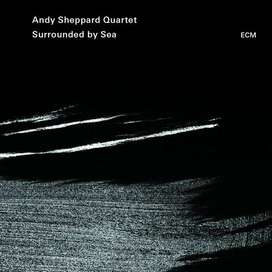
The album begins with “Tipping Point.” Bassist Michel Benita introduces a nautical sensation with his steady line. Andy Sheppard wafts in with the tenor saxophone and a picture begins to emerge. The piece was written by Sheppard and Benita. With Sebastian Rochford’s drum interpretations, the colors even out in brilliance.
Sheppard, Benita and Rochford were the three members of Sheppard’s Trio Libero, also an ECM record (ECM 2252). The quartet now adds Eivind Aarset, the Norwegian guitarist of fame.
An astoundingly lovely “I Want to Vanish” shows the shining lyricism of Sheppard on soprano sax. Aarset’s ambient watercolor guitar and Rochford’s brushes turn this Elvis Costello piece into a work of Jazz wonder. Always a fan of Costello, I never imagined a transition like this.
The traditional Gaelic song “Aoidh, Ne Dean Cada Idir (Aoidh, Don’t Sleep At All), Part One” is arranged by the quartet. Sheppard had learned the song from folk singer Julie Fowlis and had initially planned a recording project with her, so each member of the quartet had worked their parts around her a capella version of it. Then, according to Sheppard, it became clear that this was a good quartet and became interesting in “forming a band with this line-up.”
When the quartet recorded it, producer Manfred Eicher urged them on, creating an extended piece. The whole recording of the song was then broken into three parts and was woven in and out of the other tracks.
In the arrangement of the folk song, the feel of drowsiness is palpable. Rochford’s drumming is low-key and subtle. Aarset’s guitar is awash with mood and dream. Sheppard’s soprano sax stabs at wakefulness in the most imaginative of ways.
Andy Sheppard’s “Origin of Species” follows with warmth and hope. There is an optimism in Sheppard’s changes and tones. Benita’s double bass is a procession of ascent. An exquisite piece
Sebastian Rochford composed “They Aren’t Perfect and Neither Am I.” The listener is easily taken with the rhythm section in Rochford’s altered beats and Benita’s bowed bass. Aarset’s guitar adds cleaner tones along with the odd pickings and slight distortion. Sheppard’s intonations are thought-provoking and fascinating.
Aarset and Benita briefly introduce “Meditation” (Sheppard, composer). Sheppard then joins in harmony with Aarset, who then holds the melodic lines and allows Sheppard to explore the ever-widening expanse created.
The piece begins mantra-like and then opens into wider examination and exploration for Sheppard, as Aarset and Benita hold the groove. The breathy tones of Sheppard begin to fade, leaving Aarset’s mantra in place. Beautifully done.
The second part of “Aoidh, Na Dean Cadal Idhir” follows in harmony for only the briefest of moments before giving way to Sheppard’s piece “The Impossibility of Silence.” The track has a long, quiet fade-in before the tenor sax proves the truth of the song’s title. There is a nocturnal element that is doubled by Benita’s elegant bass. Sheppard is masterful and Benita has episodes of running in lock-step harmony with the sax.
Aarset’s guitar is almost like cosmic background radiation to the works of Jazz creation by Sheppard and Benita. The track fades as slowly as it began.
Another Andy Sheppard work, “I See Your Eyes Before Me” is the ninth track and sees all four artists following separate musical pathways until all attention begin to focus into a single vision. It is an interesting and fulfilling stroll.
“A Letter” (Michel Benita, composer) has Sheppard back on soprano sax in a melancholy recitation that witnesses some of Benita’s most open and thoughtful bass work. Rochford keeps the rhythm understated with the brushes as Sheppard takes off on brief moments of fancy and wistfulness. Beautifully melodic.
Part Three of “Aoidh, Na Dean Cadal Idhir” closes the inter-weaving of the folk song. I confess to playing the three tracks (3,7,11) consecutively to hear the complete song. A thing of enchantment, to be sure, but the weaving effect is an imaginative and rewarding choice. Kudos to Manfred Eicher, producer.
“Looking for Ornette” by Andy Sheppard is probably a description of every sax player’s quest in some way or other. In Sheppard’s words, “When I composed and whenever I play ‘Looking for Ornette’ it’s exactly what I am trying to do.” Love him or hate him, every Jazz lover must come to confront Ornette Coleman. Sheppard shows why this is true.
In an album speaking of England, Andy Sheppard has brought together artists from Norway to Britain to Algeria. They have accepted and answered his vision to create the extraordinary.
The compositions and arrangements are fluid expressions of Sheppard’s main theme. The artists are well-disciplined in knowing exactly what to play and—more importantly, perhaps—when not to play. The space they create is never void but is, rather, filled with vivid expectancy. The=is quartet is the logical, even inevitable, next evolutionary step for Andy Sheppard’s musical vision and leaves a deep anticipation of what is to come.
"Surrounded by Sea" will be released on June 2, 2015.
 RSS Feed
RSS Feed
